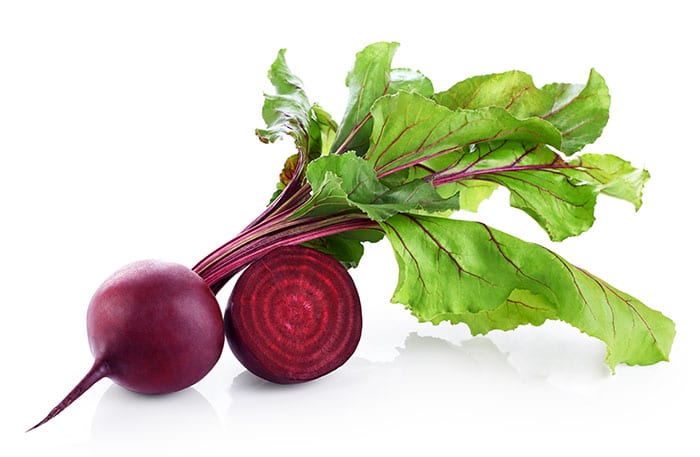
Everyday Chemicals Are Screwing Up Your Testosterone
You may have already read my other article on 7 habits which are killing your testosterone. There was a section in that on Water because

Packed with healthy nutrients like iron, potassium, calcium, and protein, beets are a fantastic addition to your diet – but this humble root packs some powerful benefits that make them mandatory if you want lifelong health and supercharged performance.
The benefits of beets include:
That’s not all; let’s look at some other science-based benefits that make beets a real ‘superfood’.
Beets boost athletic performance in a unique way with betacyanin, the substance that gives beets their distinctive color. Betacyanin contains the nitrates (3) which increase the blood’s oxygen-carrying ability (4).
One study (5) found that cyclists who drank concentrated beet juice used about three percent less oxygen during exercise tests than those that drank a placebo. This is because beets contain nitrates which our bodies convert to nitric oxide (NO) which opens up blood vessels to improve oxygen uptake.
In another study, published in the journal Nitric Oxide (6), researchers put competitive cyclists through a series of tests. Each one drank two doses of concentrated beet juice or a placebo every day for a week.
After seven days of real beet juice their power increased significantly and they finished 10 kilometers almost 2 percent faster than with the placebo.
There’s an impressive amount of human data that suggests that more Nitric Oxide (NO) can improve performance in high intensity interval training, reduce the amount of oxygen required for exertion, and affect the rate of perceived exertion (7, 8).
NO brings extra blood flow, which is why it may make trained muscles feel more ‘pumped’ and bigger during a workout. Because of this nitrates could almost be considered a bodybuilding supplement.
As a side note this also makes fermented beets and outstanding supplement for performance between the sheets as well!
While dietary changes that include limiting processed foods, refined carbs, and salt can reduce heart disease risk, research suggests adding foods high in dietary nitrate is also an important step.
High blood pressure and narrowed blood vessels are the most common risk factors for heart attack and other cardiovascular diseases (9).
Nitrate is a compound that is naturally found in beet juice. Because it decreases blood pressure by dilating blood vessels, dietary nitrate can help to decrease your risk of developing heart disease.
Our mental faculties naturally decline with age. Sometimes this decline can result in conditions like dementia. Declining blood flow to the brain that reduces oxygen levels may contribute to this decline (10, 11, 12).
But the nitrates in beets may also improve mental and cognitive function by dilating blood vessels and increasing blood flow to the brain (13). Beets have been shown to especially increase blood flow to the frontal lobe of your brain, the area associated with higher-level thinking like decision making and working memory (14).
Another study in type 2 diabetics examined the effect of beets on simple reaction time, a measure of cognitive function. Simple reaction time during a cognitive function test was four percent faster in subjects who drank 8.5 ounces of beet juice daily for two weeks, compared to a placebo (15).
The substances that give beets their deep red color may also have powerful anti-cancer properties.
Studies have shown that beetroot extract reduced multi-organ tumor formations in various animal models when administered in drinking water (16).
Beetroot extract is also being studied for use in treating human pancreatic, breast and prostate cancers (16).
Also, raw beets help boost the immune system thanks to high vitamin C, potassium and manganese, while betalin pigments and sulfur-containing amino acids in beets support the body’s Phase 2 detoxification process (17).
Beets and juice extracted from fresh beets are high in sugar, which can be a potential concern for keeping blood sugar at healthy levels.
They contain 36 percent simple carbs, so you can’t consume large amounts without getting large amounts of sugar in your system.
But when beets are fermented the bacteria that make the process possible (18) eat all the sugar and turn it into alcohol which is evaporated away during the drying process.
Fermented food also contains probiotics or good bacteria. Studies have demonstrated how the balance and diversity of bacteria in the gut can optimize physical and mental well-being (19).
Last but certainly not least is the fermentation process can more than double the nitrate content of beets because it concentrates the nitrates. That can translate to a much higher nitric oxide boost in your body!
Concentrated beetroot supplements powerpack in the nutrients of this amazing superfood. That’s why in our Next Level Superfoods Multivitamin we provide 750 mg of beetroot in a 4:1 concentrate.
That is equivalent to 3,000 mg of beetroot!
REFERENCES

You may have already read my other article on 7 habits which are killing your testosterone. There was a section in that on Water because

Rhodiola Rosea stands out as a potent adaptogenic herb with a rich history of traditional use and a growing body of scientific research. Revered for

In this comprehensive article, we will explore what L-tyrosine is, its benefits as a pre-workout supplement, the correct dosage, and other potential health benefits it

Betaine anhydrous is becoming an increasingly popular ingredient for pre-workouts. In this article, we will explore the fundamentals of betaine anhydrous, its connection to carnosine,

Beta-alanine is a pre-workout powerhouse. From boosting workout performance to potential anti-aging effects, discover why this amino acid is a favorite among health buffs.

You may have already read my other article on 7 habits which are killing your testosterone. There was a section in that on Water because

Rhodiola Rosea stands out as a potent adaptogenic herb with a rich history of traditional use and a growing body of scientific research. Revered for

In this comprehensive article, we will explore what L-tyrosine is, its benefits as a pre-workout supplement, the correct dosage, and other potential health benefits it
Discount Applied Successfully!
Your savings have been added to the cart.